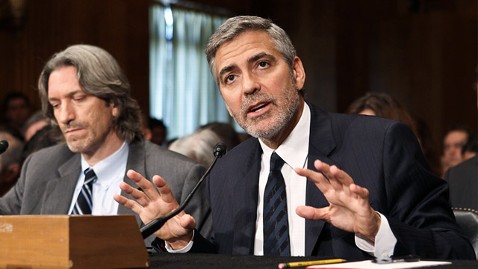Clooney on Capitol Hill: "The Constant Drip of Fear" in Sudan

(Image Credit: Paul Morigi/WireImage)
As Americans face ever-higher gas prices, actor George Clooney argued today before the Senate Foreign Relations Committee that what happens in conflict-torn Sudan affects American pocket books.
"South Sudan is shutting off its oil," Clooney said. "Six weeks ago the South shut down their oil production. They just stopped. And overnight China lost 6% of its overall oil imports, which means they have to go elsewhere, and that raises the price of oil."
Clooney called on the United States Senate to help toughen the sanctions on the Khartoum government, a government he says is committing "war crimes" against civilians, with a bill similar to one the House passed, the "Sudan Peace Security and accountability Act."
Clooney asked the senators on the Foreign Relations Committee to increase America's engagement in "real diplomacy," starting with China, to help solve the cross-border issues together, for "good, solid economic reasons" for both countries.
He also called on the Obama administration to send a high-level envoy to China to work together on this issue.
"We can take this moment and engage with China," Clooney said.
"There are economic reasons to do this for both of us and it seems to me that we can use this opportunity, this window of opportunity before it gets too long, too late, by sending a high-level envoy," the actor said.
Clooney was just back from a trip to the violent border region between Sudan and South Sudan where he observed the aftermath of the bombing of villages in the Nuba Mountains, by Sudanese government forces.
Aided by a short video of his trip last week, Clooney told of villagers forced to dwell in caves out of "constant drip of fear" from the aerial attacks.
"We found children filled with shrapnel, including a 9-year-old boy who had both of his hands blown off," Clooney said. "It is a campaign of murder and fear and displacement and starvation."
Clooney was speaking on behalf of the Satellite Sentinel Project, and he was accompanied by John Prendergast, the organization's founder, who also spoke to the committee.
The Satellite Sentinel Project uses satellite images to monitor southern Sudan, in what it calls a kind of "anti-genocide paparazzi." Prendergast says the satellite images are used to "create evidence for future arrest warrants and prosecutions based on the crimes that are being committed now. "
Sen. Jeanne Shaheen, D-NH., wanted to know if, given the popularity of the video, Clooney is contemplating a "stop Kony-like" video for Sudan.
Clooney, as he said in an interview on "Good Morning America" this morning said he was surprised by the response to the Kony video and noted the powerful role that social media can have in raising attention world-wide to all atrocities.
"Social media can really be a very big deal now, YouTube and twitter and all those elements can be a way to keep young people involved," Clooney said. He added that the Satellite Sentinel Project plans to make its videos and other materials about the atrocities in Sudan available to the public.
But Clooney noted the problem of "donor fatigue" as well as "misery fatigue," and said that big pushes around singular events are extremely important to keep momentum going.
Clooney will meet with President Obama and Secretary of State Hillary Clinton later this week.